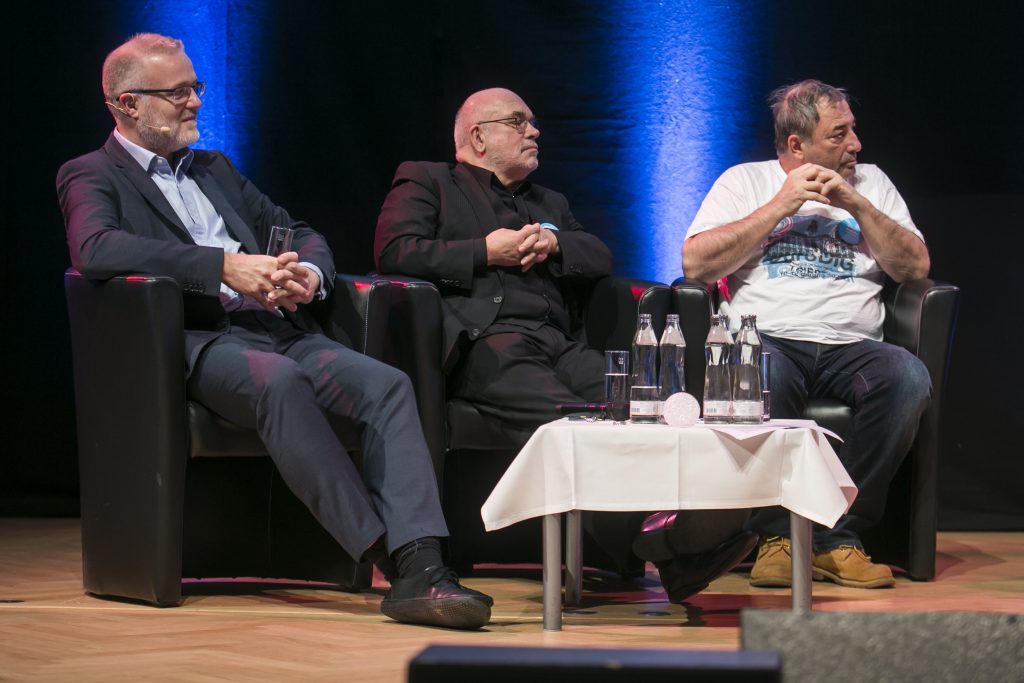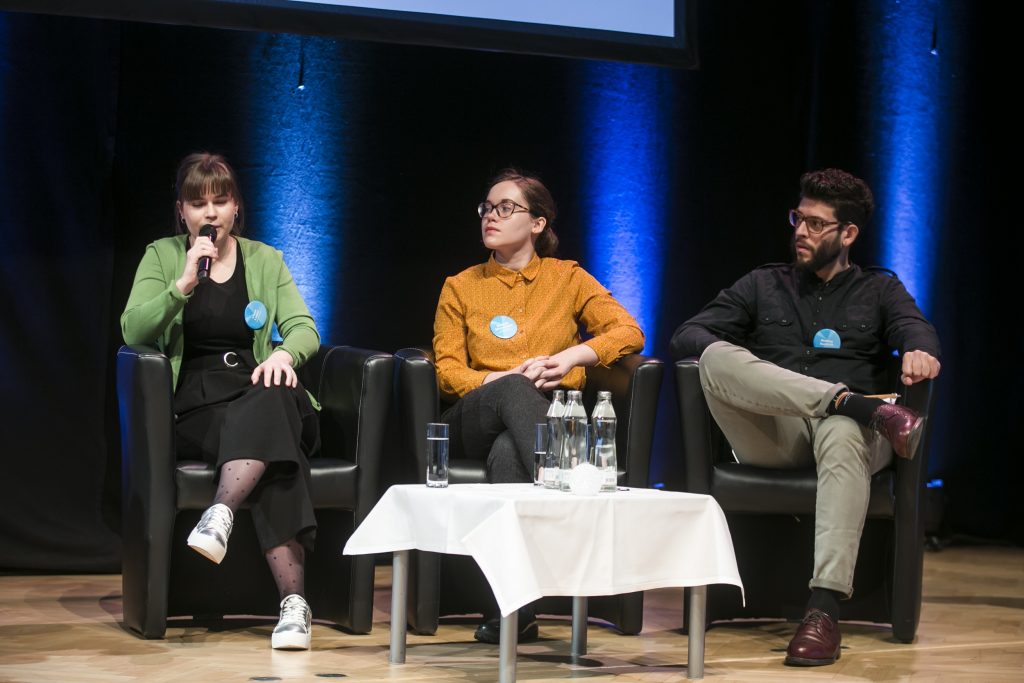
Young people are the future. And the next generation was the feature of the first morning of the Domain Pulse conference in Innsbruck, Austria, in February. First up was a keynote by ICANN’s Chair Maarten Botterman titled My Vision for Internet Governance and ICANN which was followed by a panel discussion featuring Botterman on the next generation featuring a couple of old timers who have led internet governance issues over the last couple of decades, particularly in Europe, Roberto Gaetano and Wolfgang Kleinwächter, and three that are part of the next generation, Lili Leisser, Elisabeth Schauermann and Matthias Hudobnik. Afterwards, for part two of our interview with the ICANN Chair, we focussed on how to get the next generation involved in internet governance and the future of the domain name system as well as how ICANN works with governments around the world to work towards a secure and stable DNS.
First up, do domain names have a future? Botterman believes so.
Even if there’s a lot of end users who think Google and various apps are all
that’s needed. At the same time, people who have their business online, even
when they can be found via Google or offer their services via an app, they
still want to choose a domain name that reflects their identity.”
Looking into his crystal ball, paraphrasing the conference
theme, Botterman noted he would be surprised if there wasn’t a future for the
domain name system – even if the future may look entirely different than we
expect, today.
“It’s an excellent system that makes it possible for humans
to find things online. It’s also an inexpensive system if you look at the total
costs of doing online business.”
But there must be changes and over the years, Botterman
pointed out some of these have included increased security such as DNSSEC and
TLS so the DNS becomes a trusted infrastructure on which you can and would want
to do multiple things. This will also require actively fighting abuse of the
DNS – one of the current main themes in the ICANN community.
To have a future, the DNS will also need to have future
generations involved, such as through the multistakeholder environment
championed by ICANN and its community. So how does one reach out to the next
generation?

Botterman believes ICANN has successfully reached out to the
next generation through programmes such as NextGen and the Fellowship Program,
pointing out that one participant in the panel discussion, Matthias Hudobnik, is
a NextGen graduate.
“ICANN’s NextGen and Fellowship programmes are really
pulling in people from all over the world. This is also followed with interest by
the board; and we actually have two board members that have been part of the
Fellowship programme. The Board believes that the programmes are helpful to
grow a global understanding in what ICANN does, and is happy to see that many from
the Fellowship programme for instance, become active contributors to the ICANN
community. It is something ICANN is investing in because we believe in its
importance.”
“Another way we can reach the next generation of online
users, is through online participation, which is already possible through the
remote participation culture we have at ICANN – from our annual public
meetings, to ICANN’s learning platform. A student with an interest in the DNS
industry could dive into issues to do with ICANN via the ICANN website, find
papers, training webinars, even contribute to a public consultation of interest.
And they could engage with fellow students.”
While Botterman acknowledges it’s not going to immediately
make one’s voice heard at the highest level, this is how you grow into the
system, understand how it works and help to change it from the inside out. And
the then upcoming virtual ICANN meeting, Botterman said would open up more
possibilities as there wasn’t a need for participants to allocate as much time
to attend and it’s cheaper to participate.
“So,” Botterman said, “it’s these opportunities to get
involved: the face-to-face meetings which are global but also regional, there’s
the online meetings in which everybody can participate and responses to policy
documents as part of the public consultations that are very welcome.”
Another method of participation, as noted by Gabriella
Schittek, ICANN’s Global Stakeholder Engagement Senior Manager for the Nordic
countries and Central Europe, is through her and other ICANN colleagues regularly
going to universities to engage young people and students. Which means the next
generation doesn’t have to go to an ICANN meeting to learn about ICANN. There
are often local opportunities to try locally first if one doesn’t have the resources
or ability to go to an ICANN meeting.
As part of its reaching out to diverse communities around
the world, not to the next generation, but to governments, I asked about ICANN’s
working with governments and what are the benefits of this?
Botterman pointed out one way is with the Government
Advisory Committee that brings together more than 170 countries who have signed
up to be part of the ICANN community. This ensures ICANN is informed about
government perspectives on matters and allows the GAC representatives to inform
their governments on ICANN developments. In addition, ICANN actively reaches
out to “inform governments at the earliest possibility as we become aware of
relevant legislation that would impact the internet as we know it.”
“This also involves the ICANN community informing ICANN of legislation
around the world before it becomes law so we can then inform governments on its
impact. It’s not lobbying. It’s not questioning the authority of governments to
make their own policy. But it’s very much, our readiness to offer our technical
expertise, to make sure governments are aware of what the potential consequences
would be for the functioning of the DNS of specific new legislation.”
“And that helps us to continue to maintain a mission of one
single open end-to-end internet that is secure and stable.”
And are governments responsive? Botterman thinks so. For example,
in Europe.
“The European Commission data protection authorities work
with us to find solutions and are committed to helping,” Botterman explained. “Because
we come from a ‘please help us understand how to deal with this?’ angle as we
want to comply with the law; you see a careful willingness to engage with us to
make that happen.”
It’s not just Europe though. “We have been asked for our input
at the UN and governments around the world. I’m also participating in capacity
building events where we often also see government officials, not only from Europe
but also Africa and beyond. And, again, the GAC is providing ICANN with a
unique opportunity for interaction with more than 170 member states participating
today and they’ve committed to wanting to be represented in the GAC. Even if
that doesn’t mean all 170 show up every time, I think that’s a great sign of ICANN’s
credibility and it adds to our ability to engage with government.
ICANN, as Botterman explained, is constantly working on improving
accountability and. One way this is happening the ICANN Chair explained is “improving
the structure of accessing information on our website, because almost
everything is there, but it wasn’t always easy to find. Another example is that
we are proactive in keeping people informed through our communications’
channels like blogs or announcements.”
And lastly looking to the future, I asked the ICANN Chair
what he would like to see changed. Botterman focussed on changes to the multistakeholder
model he’s observed that over the last year. Here he thought there were a
couple of areas that could really benefit from lessons learnt and from good
practice such as “openness and learning.”
“I’ve already seen change over the time I’ve been involved
with ICANN, however I don’t take credit for that, because it all started before
I was even on the Board. In the past ICANN has been seen as a defensive
organisation fending off people. I think people now realise that the ICANN
Board is working with the community to determine what the objectives are and to
reach them together. So, I think that openness is a key condition that has been
improved and needs to be continually improved. That’s something that will never
be finished because you need to continually work on it.”
“I think the multistakeholder model improvement process
we’re going through will offer great opportunities for step-changes in the
community working better together.”
“Of course, all the stakeholders have their own interests. But
we have one common interest and that’s a secure and stable domain name system
that serves the world; and that there is one global internet.”
And was there anything else? Botterman wanted to make a
point that he is “very passionate about ICANN and the domain name system. “Yeah,
just passionate about it,” he reinforced. “With all the tensions, all the
difficulties, all the business interests and the political interests, what I
find striking is to again and again meet people that are there with passion.
And that gives me a lot of energy.”
“These people make ICANN function, whether they are part of
the community, the organization, or the Board – there are many people that care
and go the extra mile – again and again. But with the global character of our
activities such as working across time zones, there is a danger of burnout. We
are very much aware that. We need to
keep in mind, that although there is always more work to do, we need to be
constantly aware that our work revolves around people. This means we need to
work together to help and protect each other from burnout, to successfully
carry on with our work.”
This latest Domain News has been posted from here: Source Link
